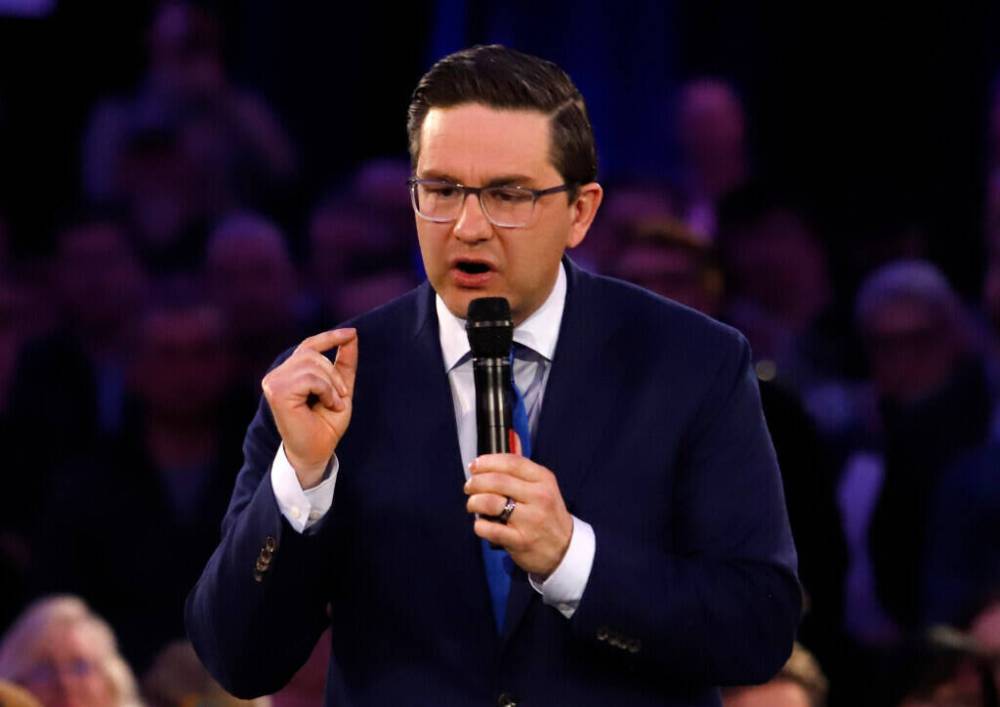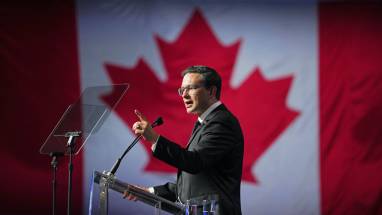Poilievre must show he’s ready to lead
Read this article for free:
or
Already have an account? Log in here »
To continue reading, please subscribe:
Monthly Digital Subscription
$19 $0 for the first 4 weeks*
- Enjoy unlimited reading on winnipegfreepress.com
- Read the E-Edition, our digital replica newspaper
- Access News Break, our award-winning app
- Play interactive puzzles
*No charge for four weeks then billed as $19 plus GST every four weeks. Offer only available to new and qualified returning subscribers. Cancel any time.
Read unlimited articles for free today:
or
Already have an account? Log in here »
Hey there, time traveller!
This article was published 11/09/2022 (835 days ago), so information in it may no longer be current.
Pierre Poilievre’s resounding 68-per-cent win in the Conservative Party of Canada’s leadership vote should give him unchallenged control of the party for at least a couple of years. Rebellious Conservatives who think of removing him as his predecessors Andrew Scheer and Erin O’Toole were removed will be awed into submission by Mr. Poilievre’s overwhelming support from CPC members in all provinces.
Related coverage
• Pierre Poilievre elected leader of the Conservative party with massive victory
• Trudeau on the attack against Poilievre’s ‘irresponsible’ politics
• New Tory leader Poilievre drops in on Quebec caucus before meeting with MPs, senators
• Quebec election: Poilievre win looms on trail as Legault causes stir on immigration
• First the win, now the work: What Pierre Poilievre has to do next as new Tory leader
• Pierre Poilievre: A look at the new Conservative leader’s key campaign promises
• Quick Sketch: Meet new Conservative leader Pierre Poilievre
• Quotes about Pierre Poilievre’s Conservative leadership victory
In his victory speech, Mr. Poilievre said the things Conservatives love to hear – things about preserving freedom and supporting hard-working people, about increasing Canada’s energy production and building more oil pipelines, and about cutting taxes and widening people’s freedom to refuse vaccination.
His thinking was clearly popular with Canada’s Conservatives. It was less clear how well his message will echo outside CPC circles.
Mr. Poilievre wisely did not repeat at the convention the more outlandish ideas he had offered during the leadership campaign. He did not repeat his threat to fire Bank of Canada Governor Tiff Macklem. Nor did he again say he would prevent his cabinet ministers from attending events of the World Economic forum, or close down the Canadian Broadcasting Corporation.
He may still intend to fire the governor, boycott the economic discussion group and close the CBC, but he now knows better than to talk about these plans after the mockery he suffered during the summer. His critics outside the party, however, will still be free to remind him of those gaffes.
The new Conservative leader displayed some confusion about the role of government in Canada. He said he wants to stop the government from sticking its nose into everything, yet he wants to force provinces to reform the income support programs that discourage welfare recipients from taking jobs that will cut their welfare entitlements. He also plans to compel municipalities to streamline their development approval processes and allow high-rise buildings on top of transit stations.
None of this is likely to happen, because the federal government does not regulate either provincial welfare programs or municipal development processes. Mr. Poilievre’s talk of a shortcut that will magically allow pipelines to be built in provinces and on First Nations lands where they are not wanted was of the same ilk – empty rhetoric Conservatives love to hear but political realities will not accommodate.
Mr. Poilievre concentrated most of his rhetorical fire on inflation, which he will end by reducing taxes and government spending. Which government spending programs he will curtail he did not say, but since he is going to restore safety to crime-plagued streets and speed up issuance of Canadian passports, there will clearly be some spending increases.
FILE PHOTO CPC Leader Pierre Poilievre
If Canada is in an angry mood, Mr. Poilievre might be the man of the hour who can channel the country’s anger. For Canadians who are not angry, however, it will still be important for the Conservatives to look like a party that is ready to govern and not merely a common front of the aggrieved.
The current Parliament was elected last Sept. 20, not yet one year ago. Justin Trudeau’s Liberal government, assured of New Democratic Party support, is unlikely to call an election before the fall of 2025. Mr. Poilievre takes the Conservative party reins with plenty of time ahead of him to show that he is more than an attack dog in a tailored suit.
By 2025, inflation may no longer be the grievance of the moment. Justin Trudeau may no longer be Liberal leader and prime minister. Mr. Poilievre’s challenge will be to show the country he has the style and intellectual substance they expect in a prime minister.










